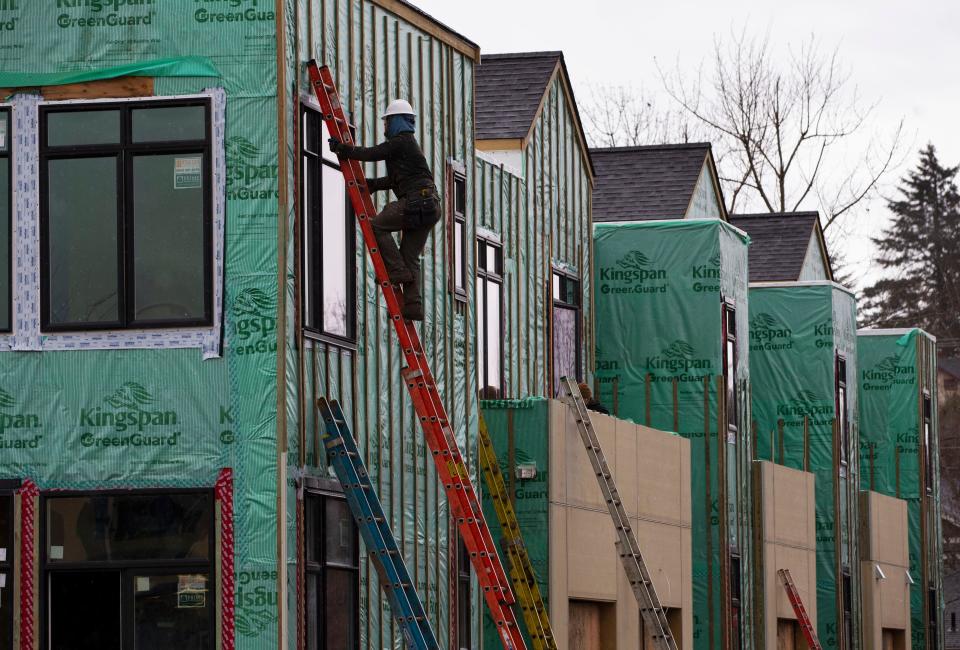Eugene housing plan hits legal roadblock as appeals board rejects latest proposal
The Oregon Land Use Board of Appeals (LUBA) said Eugene's new housing rules, which allowed more duplexes and townhouses in single-family areas, still don't meet state requirements for planning infrastructure.
The Eugene City Council passed rules allowing middle housing, such as duplexes and townhouses, in single-family zones, in 2022. The state Legislature required the change through 2019's House Bill 2001, but Eugene's code went further than required, by allowing middle housing to be taller, on smaller lots and take up more of those lots.
In October, the Oregon Court of Appeals struck down the code, saying the city did not demonstrate compliance with Statewide Planning Goal 11, which requires cities to plan for infrastructure to match the level of development.
City councilors reexamined the code in January and passed a revision in March. At the time, a majority of councilors interpreted the remand as a lack of "background information" rather than a rejection based on substance and passed a revision that focused on adding more information.
LUBA rejected the revised ordinance as well in a July 10 ruling, saying the city still "does not demonstrate that existing public facilities and planned infrastructure improvement projects are sufficient to serve any increased density resulting from the Middle Housing Amendments" and that the city's regulations "don't ensure 'sufficient infrastructure' for increased density allowed by the Middle Housing Amendments."

On the first point, the city argued its Public Facilities and Services Plan "demonstrates that almost all areas within the city are served or can be served in the short term," but LUBA determined that "there is not an adequate factual base for the city's conclusion."
"The record contains no evidence or estimate of what increased density will likely result from the Middle Housing Amendments. Thus, there is no city estimate of residential density from which to measure whether the PFSP and planned infrastructure projects therein are sufficient," the opinion said.
On the second point, the city said its policy is to only approve development applications if there is already sufficient infrastructure or if the developer plans to expand capacity. LUBA acknowledged this practice, but ruled it was not enough to satisfy Goal 11, saying the city did not "adequately explain how the cited city code provisions and permitting process address the sufficiency of public facilities."
Paul Conte, the plaintiff for the second case and one of three plaintiffs for the first case, described the result as LUBA having "slammed the City of Eugene's attempt to flout Statewide Planning Goal 11."
"This is a huge indictment of a failed mayor and the city manager and her planning director and city attorney," Conte told the Register-Guard. "I don't think in my decades of experience as a neighborhood advocate that I've ever seen a group of elected officials as stupid, duplicitous, and obstinate as the seven elected officials who approved the most obviously unlawful 'middle housing' upzoning, not once but twice."
Conte said he would appeal again if the City Council passes another "version of the staff's 'middle housing' scam."
Lindsay Selser, the spokesperson for Eugene's planning division, said city staff were still analyzing the decision and "don't have a comment at this time."
With the first remand, Conte's lawyer and the city's lawyers disagreed on what the remands meant for middle housing approved under the remanded codes. City staff said the permits are valid, while Conte's lawyer said they are not. LUBA did not address the permits in its decision.
Alan Torres covers local government for the Register-Guard. He can be reached over email at atorres@registerguard.com or on X @alanfryetorres.
This article originally appeared on Register-Guard: Eugene housing plans face another setback amid legal battle

